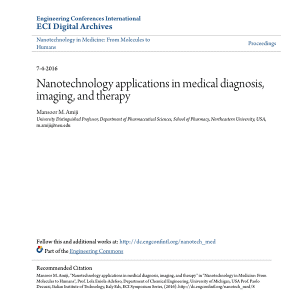
This white paper demonstrates the significant need for the facilitation of clinical translation of advances in the field of molecular medicine. It is believed when used properly, it can provide an effective diagnosis of chronic diseases and help to develop new therapeutic strategies.
According to researchers, nanotechnology plays an important role in the process of disease diagnosis, therapy, and imaging and possibly may advance the entire field of personalized medicine. In cancer, specifically, scientists are interested in using genetic therapies to reprogram the exosome-mediated tumor microenvironment by using a new, innovative platform.
In regard to anti-inflammatory therapy, a new approach has been developed to target hyaluronic acid nanoparticles and utilize a process referred to as macrophage repolarization.
The thought process behind the information contained in the white paper highlights the importance of solving various medical problems with innovative solutions that use safe, yet inexpensive materials. It also highlights the need for scalable fabrication methods to ensure these promising technologies can be implemented in the clinic in the very near future.
Originally published by dc.engconfintl.org on 7/4/2016
Nanotechnology applications in medical diagnosis imaging and th
Citations
Amiji, M. M. (2016). Nanotechnology applications in medical diagnosis, imaging, and therapy.


